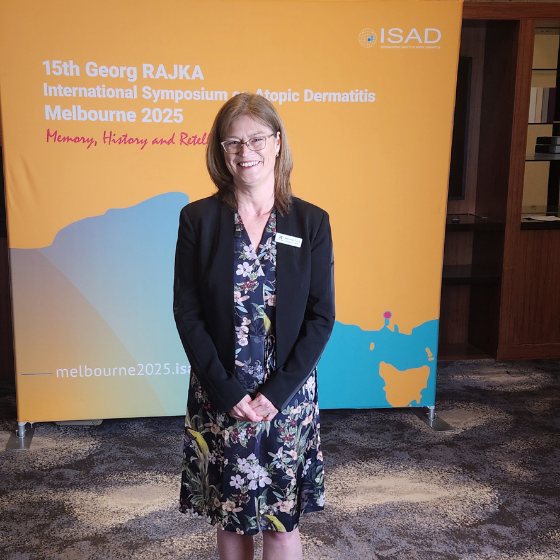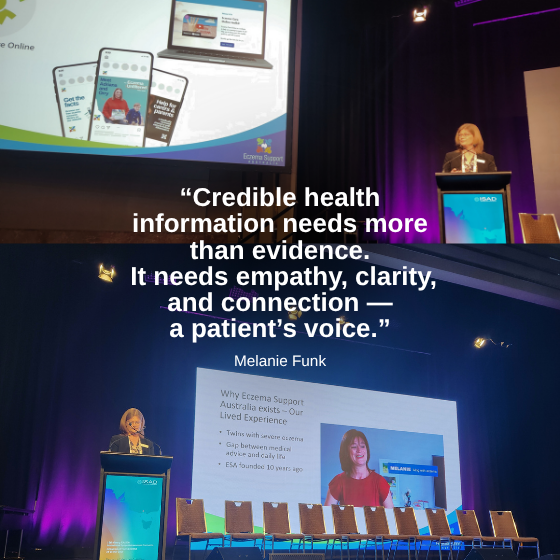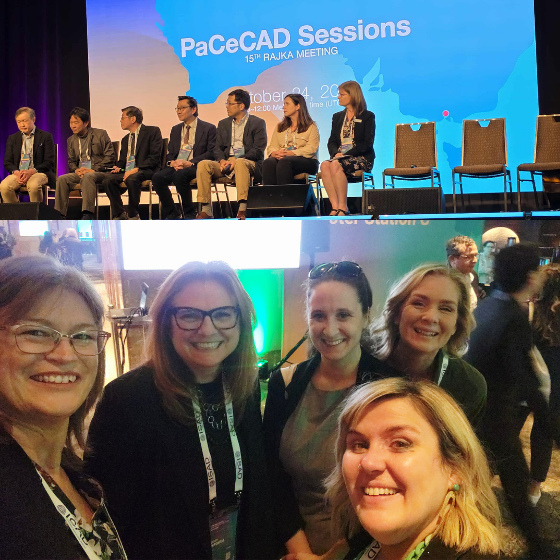Reflections from ISAD 2025
When it comes to eczema, discussions often centre on treatments, clinical studies, and medical guidelines — the evidence.
But behind every statistic is a person trying to sleep through the night, a parent desperately soothing their child’s itchy skin, or a teenager avoiding social events because of how their eczema looks or feels.
At Eczema Support Australia (ESA), the mission has always been to bridge the gap between evidence and empathy — between what science tells us and what people actually experience every day.

Why Eczema Support Australia Attends Conferences Like ISAD
Last month, Melanie Funk, Managing Director of Eczema Support Australia, represented the organisation at the Georg Rajka International Symposium on Atopic Dermatitis (ISAD) — one of the most respected global gatherings of eczema experts, researchers, and clinicians.
Melanie was invited to deliver four separate presentations throughout the conference, each focusing on the Australian patient experience and ESA’s work in making credible, evidence-based information meaningful in real life.
Being invited to present not once but four times at such a prestigious scientific meeting was both humbling and affirming — highlighting the strong reputation Eczema Support Australia has built internationally, and the growing recognition of the importance of the patient voice in eczema care.
ESA’s participation at ISAD underscored its central message: that credible information must not only be accurate, but also empathetic, relatable, and actionable for the people it’s meant to help.

Evidence Needs Empathy
In today’s world, misinformation spreads faster than facts. For people living with eczema, that can lead to confusion, wasted money, and unnecessary fear.
As Melanie shared during one of her ISAD presentations:
“Credible health information needs more than evidence — it needs empathy, clarity, and connection — a patient’s voice.”
Through its partnership with the Quality Use of Medicines Alliance, Eczema Support Australia has helped develop and deliver practical, trusted resources such as the Eczema Care Plan, the Eczema Management Algorithm, and a national education program for health professionals. These tools are now being used by thousands of doctors, nurses, and pharmacists across Australia — and just as importantly, by patients and carers at home.

Building Trust with Health Professionals
ESA’s presence at global conferences like ISAD complements its ongoing engagement with the Australian medical community.
We regularly participate in GP educational events and health professional conferences, where Melanie shares insights from the patient community to help ensure eczema care remains consistent, compassionate, and evidence-based.
The growing number of invitations ESA receives to present at professional events reflects the trust and respect it has earned within the healthcare sector. Health professionals increasingly recognise that the best eczema care happens when medical evidence meets patient experience — when clinical science is guided by empathy and informed by the lived experience of patients.
The Bigger Picture
Across the world, the challenges faced by people living with eczema are remarkably similar:
- Access to the right medicines and specialists
- Reliable, evidence-based patient information
- Recognition of the patient voice as essential to care
Through collaborations with the Australasian College of Dermatologists, the Quality Use of Medicines Alliance, and global partners such as GlobalSkin, Eczema Support Australia continues to turn lived experience into action. Together, these partnerships are helping to shape eczema care that is consistent, evidence-based, and truly person-centred.
Looking Forward
Every invitation to speak, every collaboration, and every new connection builds on one simple goal: to ensure Australians living with eczema are seen, heard, and supported.
Because evidence alone can inform — but empathy transforms.
And when brought together, they do more than treat eczema — they change lives.